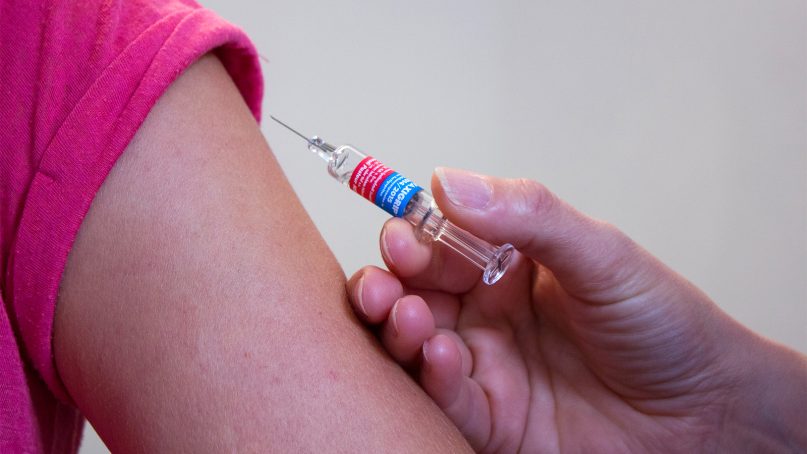HARTFORD (RNS) — The anti-vaxxers have been out in force at the Connecticut State House this week, demonstrating by the thousands on the street and testifying by the hundreds at a public hearing that began Wednesday morning and didn’t wind up until 8 a.m. Thursday. The object of their ire is House Bill 5044, which would do away with religious exemptions that allow children who attend public or private schools to pass on vaccinations.
In fact, very few religious traditions oppose vaccination. In the very first controversy of this sort in American history, it was the Congregational establishment in Boston that promoted smallpox inoculation in 1721, with the opposition coming from an anti-establishment cabal that included the young Benjamin Franklin.
Christian Scientists traditionally oppose all medical care as showing a lack of faith in God’s healing power, and there is a contingent of Dutch Reformed who oppose vaccination as disrespecting God’s providence. Though Jewish and Muslim authorities support vaccination, adherents of both faiths sometimes oppose it out of a belief that pig tissue is used in the manufacturing process.
Similarly, Roman Catholicism expresses moral reservations about vaccines that have been developed with tissue obtained from a voluntarily aborted fetus and allows for conscientious objection to vaccination in such cases. Those vaccines are nevertheless permissible in the eyes of the church, and in fact, last month the Connecticut Catholic Conference (representing all bishops in the state) issued a statement supporting vaccinations that noted that the state’s Catholic schools require them.
Of course, Americans do not need to cite some authoritative religious teaching in order to have their religious rights recognized by the government. So long as a belief is judged to be sincerely held, the state cannot question its legitimacy.
One mother protesting the Connecticut bill did not cast her religious objection on the basis of any faith-based medical position. “We’re a religious family,” she told the local NBC affiliate. “We have experienced vaccine injury, that’s a very real thing, and that’s what prompted us to do a lot of research. And when we did that research, we were appalled at what we were putting into our kids. I swore a very intimate oath to God to protect my kids, and I will never do that to them again.”
It is nevertheless tempting to see much of the anti-vaxxer religiosity as pretextual, and there is empirical data to back up that temptation. In 2016, Vermont did away with the right of parents to exempt their children from vaccination based on “personal belief” while retaining the right to do so on religious grounds. The following year, the percentage of parents claiming a religious exemption shot up seven-fold.
Overall, states that permit personal belief and religious exemptions see a smaller proportion of religious exemptions than states with religious exemptions alone. And those that permit neither have a higher proportion of medical exemptions. Pretty clearly, anti-vaxxers are prepared to seize on any available legal means to keep their children from being vaccinated.
Constitutionally, they don’t have a leg to stand on when it comes to religion. As Connecticut Attorney General William Tong laid out in an advisory opinion issued last May, the case law makes clear that both federal and state constitutions allow religious free exercise to be overridden because there’s a compelling state interest in protecting public health. Doing away with non-medical exemptions from vaccination for all school children, Tong said, would be advancing that interest by the “least restrictive means.”
For in fact, if H.B. 5044 passes as expected and Connecticut becomes the sixth state in the U.S. (along with Mississippi, West Virginia, Maine, California, and New York) to bar non-medical exemptions, parents will still be able to keep their children from being vaccinated — on any grounds they choose. They will just have to school them at home.
That seems like a reasonable way to balance public health and the free exercise of religion, regardless of how many anti-vaxxers have cited the latter not out of religious conviction but via belief in a secular narrative about the dangers of vaccination that public health officials consider without merit.






